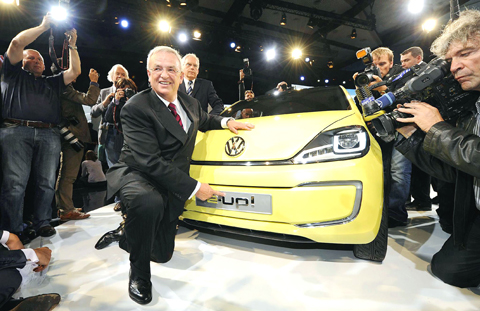Automakers put last-minute touches on fancy displays at the 63rd Frankfurt Auto Show yesterday, ready to show off future and current models in a bid to kick- start sales amid a slowly improving global economy. Many were looking years down the road by unveiling their latest electric models that are designed to go faster and farther.
Companies from Volkswagen AG to Hyundai Motor Co displayed their latest models in the cavernous exhibition space at the show, but the buzz centered on designs that eschew traditional gas engines in favor of more environmentally friendly electric motors or a hybrid blend of both.
VW chief executive Martin Winterkorn, unveiled the E-Up!, a small city car powered by an electric motor using lithium-ion batteries that can reach a maximum speed of 135kph and travel up to 130km on a single charge.

PHOTO: EPA
“The concept car now being presented in Frankfurt very realistically shows how we envision such a Volkswagen with pure electric drive — technically, visually and with regard to a practical size,” Winterkorn said of the car, which is expected to go into production by 2013 and reach production levels akin to the Polo or Opel Astra by 2020.
The European Transport and Environment association, a Brussels-based lobbying group that promotes accessible, sustainable transport, this week chastised automakers for not doing enough to reduce carbon dioxide emissions.
They said Fiat and Peugeot-Citroen have the cleanest autos on the market and are closest to meeting EU standards. BMW and Mazda made the most progress, reducing emissions for cars sold in Europe by 10 percent and 8 percent respectively.
Other automakers are bringing their vision of electric cars to Frankfurt, too, including Renault, which has four new models planned for the show; a hybrid Mercedes B-Class, called the F-Cell, which sports a fuel cell and an electric motor; and the first plug-in version of Toyota’s Prius hybrid, featuring a battery that can be charged from a household outlet.
GM will tout its Chevrolet Volt, a plug-in electric which uses an internal-combustion engine to extend its range beyond the standard commuting distances its batteries are designed to handle.
Those cars are headed for consumers soon, but BMW AG gives a look farther down the road with its low-slung supercoupe, the Vision EfficientDynamics. It’s a high performance, plug-in diesel-electric hybrid powered by a three-cylinder 1.5-liter turbo engine, and by not one but two electric motors, one for the rear wheels, one for the front.
Organizers said 753 exhibitors are on hand for the event, which will be opened to the public by German Chancellor Angela Merkel tomorrow and run through Sept. 27.
Matthias Wissman, president of the German Association of Automotive Industry, said that 62 vehicle makers are at the show, with 82 world premieres.

The Central Weather Administration (CWA) yesterday said it expected to issue a sea warning for Typhoon Fung-Wong tomorrow, which it said would possibly make landfall near central Taiwan. As of 2am yesterday, Fung-Wong was about 1,760km southeast of Oluanpi (鵝鑾鼻), Taiwan’s southernmost point, moving west-northwest at 26kph. It is forecast to reach Luzon in the northern Philippines by tomorrow, the CWA said. After entering the South China Sea, Typhoon Fung-Wong is likely to turn northward toward Taiwan, CWA forecaster Chang Chun-yao (張峻堯) said, adding that it would likely make landfall near central Taiwan. The CWA expects to issue a land

Taiwan’s exports soared to an all-time high of US$61.8 billion last month, surging 49.7 percent from a year earlier, as the global frenzy for artificial intelligence (AI) applications and new consumer electronics powered shipments of high-tech goods, the Ministry of Finance said yesterday. It was the first time exports had exceeded the US$60 billion mark, fueled by the global boom in AI development that has significantly boosted Taiwanese companies across the international supply chain, Department of Statistics Director-General Beatrice Tsai (蔡美娜) told a media briefing. “There is a consensus among major AI players that the upcycle is still in its early stage,”

The Central Weather Administration (CWA) yesterday said it is expected to issue a sea warning for Typhoon Fung-wong this afternoon and a land warning tomorrow. As of 1pm, the storm was about 1,070km southeast of Oluanpi (鵝鑾鼻), Taiwan’s southernmost point, and was moving west-northwest at 28 to 32kph, according to CWA data. The storm had a radius of 250km, with maximum sustained winds of 173kph and gusts reaching 209kph, the CWA added. The storm is forecast to pass near Luzon in the Philippines before entering the South China Sea and potentially turning northward toward Taiwan, the CWA said. CWA forecaster Chang Chun-yao (張峻堯) said

PREPARATION: Ferry lines and flights were canceled ahead of only the second storm to hit the nation in November, while many areas canceled classes and work Authorities yesterday evacuated more than 3,000 people ahead of approaching Tropical Storm Fung-wong, which is expected to make landfall between Kaohsiung and Pingtung County this evening. Fung-wong was yesterday morning downgraded from a typhoon to a tropical storm as it approached the nation’s southwest coast, the Central Weather Administration (CWA) said, as it issued a land alert for the storm. The alert applies to residents in Tainan, Kaohsiung, Pingtung and Taitung counties, and the Hengchun Peninsula (恆春). As of press time last night, Taichung, Tainan, Kaohsiung, and Yilan, Miaoli, Changhua, Yunlin, Pingtung and Penghu counties, as well as Chiayi city and county had